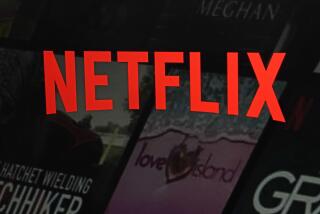Netflix to pay Comcast for smoother online video streaming
Netflix has agreed to pay Comcast to ensure the subscription service’s movies and TV shows stream seamlessly in a deal that underscores the power of distribution in the digital era — and could mean higher rates for consumers.
The nation’s leading online video service and the largest U.S. provider of home Internet access said the agreement is designed to ensure that Netflix subscribers can watch the new season of “House of Cards” and other content free of the pauses and hiccups subscribers have reported in recent months. The agreement may pave the way for similar arrangements between Netflix and other Internet service providers, including Verizon and AT&T.
Consumer advocates and technology policy experts reacted with concern over the ability of giant Internet access providers to extract payment from businesses wishing to reach people in their homes — and the likelihood the extra costs eventually would be passed on to consumers.
ON LOCATION: Where the cameras roll
Netflix and Comcast declined to reveal terms of their pact, which was announced Sunday.
But Wedbush Securities analyst Michael Pachter predicted that the cost of Netflix’s new deal with Comcast will one day be felt by the streaming service’s 33 million U.S. subscribers.
Comcast will “raise the price to whatever the market will bear,” Pachter said. “This will ultimately compel Netflix to raise prices to consumers.” Netflix declined to respond.
Internet providers and online streaming services have been at odds over who should bear the cost of the surging popularity of online video: companies like Netflix, that reap the benefits, or the broadband services that charge subscribers for access.
The multiyear pact comes less than two weeks after Comcast agreed to acquire Time Warner Cable Inc. in a $45.2-billion transaction that would create a broadband behemoth reaching 30 million of the nation’s 92 million high-speed Internet customers.
The proposed merger renewed calls for the Federal Communications Commission to draft rules aimed at ensuring that the Internet remains open and free of interference from a rapidly consolidating broadband industry.
Graphic: Comcast makes bid to acquire Time Warner Cable
A federal appeals court ruled last month that the regulatory agency lacked the authority to bar Internet providers from charging fees to companies like Netflix, to give priority treatment to movies and TV shows that stream across its network.
Comcast has promised to abide by the principle of net neutrality — meaning it would treat all online traffic equally and not give preferential treatment to its own video — as a condition of its 2011 acquisition of NBCUniversal. This consent degree, which extends through 2017, would apply to Time Warner Cable if the merger is completed, Comcast has said.
The Philadelphia company took pains to note that “Netflix receives no preferential network treatment” under the agreement, a statement designed to underscore Comcast’s commitment to an open Internet.
One Internet policy expert called the agreement evidence of Comcast’s sheer market clout.
“Netflix didn’t have any options,” said Marvin Ammori, an Internet policy expert at the Stanford Law School Center for Internet & Society. “And Netflix cried, ‘uncle.’”
But by making peace with Netflix, Comcast removes or at least softens the voice of a potential critic of that acquisition, which will be heavily scrutinized by lawmakers and regulators.
PHOTOS: Behind the scenes of movies and TV
“Comcast will likely use the deal with Netflix to argue that there is no need for regulatory intervention if it is capable of reaching a mutually satisfactory agreement with other parties,” wrote Bernstein Research analyst Carlos Kirjner in a research report.
John Bergmayer, a senior staff attorney for the advocacy group Public Knowledge, said the deal raises concerns about the leverage that large Internet service providers like Comcast wield in discussions with services like Netflix.
“The last-mile ISPs have gatekeeper control over many millions of consumers,” Bergmayer said. “These customers don’t have competitive options to switch.”
But Frost & Sullivan analyst Dan Rayburn blogged that the relationship between Netflix and Comcast appears to be widely misunderstood.
“It simply comes down to Netflix making a business decision that it makes sense for them to deliver their content directly to Comcast, instead of through a third party,” Rayburn wrote.
Netflix’s monthly tracking of Internet speeds shows a deterioration in recent months for Comcast and Verizon subscribers, though the reason for this sluggishness is a matter of dispute.
FACES TO WATCH 2014: Digital media
The streaming service accounts for roughly one-third of Internet traffic during prime time, according to Sandvine, a maker of communications equipment.
Netflix had been seeking direct access to Comcast’s network through an initiative known as Open Connect, in which it would use a third party to deliver its movies and TV shows to its own hardware inside or near Comcast’s facilities. It has struck agreements with Internet providers around the world, including British Telecom, Bell Canada and Cablevision.
But Comcast balked at such an arrangement, instead preferring a deal in which Netflix would pay to connect directly to its high-speed network — as do other large data providers, such as Google Inc.’s YouTube.
A Netflix spokesman said the agreement with the nation’s largest broadband provider allows for traffic growth for years to come.
“It basically means that the deterioration in performance for consumers that we’ve been seeing will reverse,” Jonathan Friedland said.
More to Read
From the Oscars to the Emmys.
Get the Envelope newsletter for exclusive awards season coverage, behind-the-scenes stories from the Envelope podcast and columnist Glenn Whipp’s must-read analysis.
You may occasionally receive promotional content from the Los Angeles Times.






